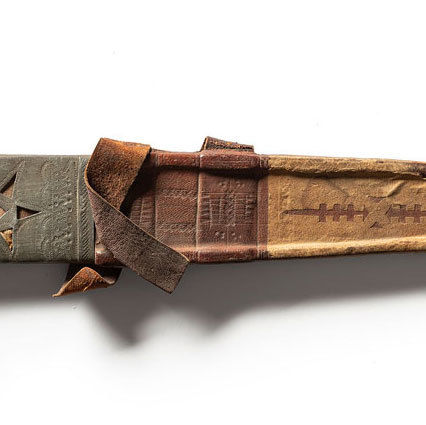The takouba sword. Photo: Museum Wiesbaden / Bernd Fickert
Current discussions of ‘colonial contexts’ often revolve around treasures from foreign cultures, including weapons from Africa, South American jewellery, and many other objects. Museum Wiesbaden also houses an ethnological collection consisting primarily of objects acquired on their travels by naturalists, missionaries, and/or merchants, most of which were donated to the museum in the late 19th and early 20th century. To this day these objects provide profound insights into the history of non-European societies, while also revealing much about the often-forgotten period of German colonialism.
In the period around 1900 numerous ethnological objects from the African colonies made their way into European collections. Both private individuals and museums sought very specific types of objects: besides sculptures, weapons were particularly prized by collectors. Demand was so great that some indigenous artisans in the large port cities started producing objects specifically for sale to Europe, laying the foundation for what would later be called ‘ethnotourism’.
The takouba sword from the museum’s collection displayed here could be an example of this type of export product. Such weapons were common primarily among nomadic groups with a tradition of mounted combat, such as the Tuareg of North Africa. During the 19th century their use spread outwards from the Sahel region, eventually becoming common in large parts of North and West Africa.



The German plantation owner Carl Feldmann donated this piece to the museum in the early 20th century (the precise date is unknown). Born in Wiesbaden, Feldmann probably lived in the German colony of Cameroon from 1907 to 1918, during which time he amassed a scientific and ethnological collection. Feldmann, a trained taxidermist, prepared and mounted the natural-history specimens himself in Africa. The acquisition history of the other pieces, however, remains unknown. Feldmann may have purchased them directly in Cameroon, acquired them from dealers, or collected them as souvenirs during his travels.
Comparisons of the Wiesbaden piece with other takouba, however, indicate that this weapon is probably the type used by the nomadic Fulani, who still lived in Nigeria and Cameroon around 1900. It is thus highly probable that Feldmann had direct contact with the sword’s former owners, although this still reveals nothing about the circumstances under which the weapon changed hands.
A broad debate on colonial contexts has recently emerged around precisely this kind of transfer of ownership of ethnological objects. While the discussion primarily addresses questions of how we should deal with this overlooked chapter in German history, and how best to forge long-term partnerships with the societies concerned, it also revolves very concretely around the objects themselves. This is where ethnological provenance research comes into play, tracing the chains of custody of the objects still in ethnological museums today. How did these objects make their way into German collections? Why were they accessioned and under what circumstances? What stories are associated with these objects and the people behind them? And finally, were all the objects that lie dormant in German museums today really acquired by acts of violent expropriation or by some other means?
Reappraisal and clarification of the chains of custody and conditions of ownership form an important component of our research at Museum Wiesbaden, as does our aspiration to facilitate collaborative partnerships through increased transparency. For this reason, Museum Wiesbaden is participating in a pilot project known as the 3-Road Strategy for the Digitisation of Collections from Colonial Contexts, addressing the objects and their biographies in greater detail as part of a series of planned special exhibitions, including From the Cape to the Namib – Southern Africa, scheduled for 2024.
Dr. Andy Reymann
Translation: Lance Anderson